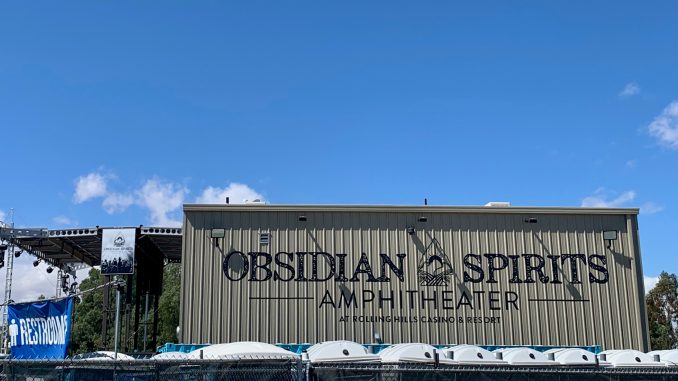
By Scott Thomas Anderson
The first time I arrived at Rolling Hills Casino, Mount Shasta was covered in snow and gleaming like an alabaster altar against an endless blue expanse of the horizon. Andrew Alejandre, chairman of the Paskenta Band of Nomlaki Indians, remarked that he hadn’t noticed the majestic mound looking so brilliant in quite some time. Considering our reality of forever drought, the sight of puffy clouds dragging shadows over Shasta’s striking white cliffsides looked almost like a miracle.
Then again, Alejandre and his family know all about miracles.
The Native-American-owned distillery the chairman was ushering me into is one miracle they’ve recently pulled off.
If it was up to the forces of “manifest destiny,” the Paskenta tribe would not even exist. Though its people have lived in the broad pastures and oak woodlands south of Mount Shasta since before recorded memory, political operators in the 20th century willfully sought to displace them from Tehama County and its surrounding areas. The land-lust that was driving this push got so bad that the Paskenta – who originally had federal recognition in the face of Euro-settlement – ended up having that status stripped away from them in 1959.
One member of the tribe who wouldn’t take this lying down was Everett Freeman, the grandfather of Andrew Alejandre.
Freeman set out on a quest to re-gather expatriated members of the Paskenta across the West. In 1994, the group that he’d assembled managed to fight their back to federal recognition. That ultimately led to it building Rolling Hills Casino as a means of supporting jobs and healthcare for the tribe.
After establishing various businesses at the casino, the Paskenta got interested in opening a distillery. They wanted to create vodka, gin, rum and whiskey for their own bars and restaurants on-premise, as well as sell bottles to other native-owned culinary businesses in California. Alejandre and the council quickly learned there was an obstacle to the plan: It was a federal law from 1834 that literally made it illegal to build distilleries on tribal land.
That measure dated back to the administration of Andrew Jackson, who most historians agree unleashed a raft of catastrophic policies against native peoples that were far more injurious – and deadly – than just policing what businesses they could operate. Nevertheless, the discriminatory spirits law remained on the books for 184 years.
It was the Chehalis Tribe in Washington who fought to make the government change course. A fishing people of the Pacific Northwest, the Chehalis successfully convinced Congress in 2018 that Jackson’s ban on distilleries in Indian Country was always unfair and unconstitutional. The Chehalis went on to open Talking Cedar Distillery some 20 miles south of Olympia. It was the first legal distillery on native land in US history.
Not long after that breakthrough, the Paskenta opened Obsidian Distillery inside Rolling Hills Casino. Alejandre personally set a sleek, herculean chunk of obsidian in the distillery’s spirit safe, which all liquids flow down before being finished as everything from classic max to rum aged with spices.
Obsidian is a stone that has deep significance for the Paskenta people. Alejandre, a gifted artist, designed the bottle graphics himself – and put the volcanic midnight jewel at the center of them.
Today, anyone over 21 can drive to Corning and head into Rolling Hills sample try Obsidian Spirits. The casino has a tidy tasting room with relaxed lighting. It’s a perfect spot for settling over a tasting flight. One of its most interesting offerings at the moment is the Obsidian Apple Pie Shine. If sipped neat, it hits like a savory apple cobbler caramelized on the crust with a cocktail torch. In these chilly months, it can undoubtedly warm one’s center with its smoldering cinnamon notes and shimmering hints of baked spices. But this is a high-proof moonshine. Not everyone will want to drink it straight. For those in that camp, there’s an easy fall-themed mixed drink that you can make with it at home called The Harvest Moon. One simply fills a mason jar with ice, pours it one-third full of Obsidian Apple Pie Shine, then almost two-thirds full of apple cider, then tops it off with a little club soda. You’ll be holding a jar with autumn-themed aromas and autumn-themed taste inflections.
The story of how the Paskenta managed to open their gaming facility, their live music amphitheater and now their class-act distillery seems to have flown under the radar with a lot of California media. But spirit fans from Sacramento to Red Bluff should definitely check the place out – and lift a glass of admiration to cultural survival and winning the fight.

Be the first to comment